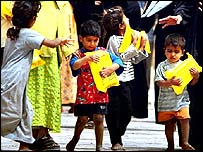All three of the orphanages in Nasiriya were trashed by looters as soon as the fighting stopped. Now a British aid agency is helping to re-open one of them.

Children happily receive food rations
|
With its bedrooms emptied of furniture, the kitchen bare and the bathrooms stripped of everything including the piping, it looks more like one of Saddam's notorious torture complexes.
Only the brightly coloured murals pertain to the building's true purpose.
But order is slowly returning to this sanctuary for abandoned children. The young residents, scattered by the effects of war and the frenzied looting that followed, have started to find their way back.
Before the war, there were three orphanages in Nasiriya - one each for boys, girls and infants.
Soon after Saddam's soldiers perished in their trenches on the outskirts of the city in one of the most blood-thirsty battles of the conflict, the looters moved in and laid the orphanages to waste.
Robbing ophanages
Here, in the girls' home, almost anything that wasn't fixed to the floor - and some things that were - disappeared.
Beds were taken with their mattresses, ceiling fans ripped from their fittings, air conditioning units carried off for re-sale.
A pile of clothes at the back of one of the dormitories is the only clue to the cupboards and wardrobes that used to be in this room.
 I've a feeling that once this is re-established we are going to be flooded - the infant orphanage was the only home for abandoned new-borns in the whole of southern Iraq
I've a feeling that once this is re-established we are going to be flooded - the infant orphanage was the only home for abandoned new-borns in the whole of southern Iraq

Norman Sheehan, War Child
|
In the courtyard, wires hang free after being ripped from the junction box. Beans from the kitchen storeroom are strewn on the ground.
Across the way in the school block, the lockers stand empty - their doors buckled by the brute force that was used to open them. A blackboard remains screwed to the wall, still showing the chalk scrawling from a lesson several weeks ago.
Scraps of classwork lie on the floor, alongside library filing cards and staff salary documents.
It's a sorry sight, but elsewhere there are encouraging signs.
Re-building
With help from the UK-based charity War Child, the girls' orphanage in Nasiriya is reopening.
The building itself is a hive of activity as staff and helpers move in new beds and fans. Most importantly of all, the children themselves are returning.
"I'm feeling comfortable and peaceful with the thought that I'm now sleeping here," says Saeed, 14, who fled to his aunt's during the chaos and then, when she left town, to stay with a friend.
Some other children also found relatives to put them up and the staff in the orphanges took some of the children home with them.
Many however have just disappeared, their whereabouts still unknown, says Norman Sheehan, of War Child.
The girls' orphanage used to house 80 girls. On the first day of its re-opening, it is expecting just 36 children to return, and that includes boys.
"I don't know where these children are. I'm praying they will return home soon," says Madea Hussein, director of the city's orphanages.
Awaiting new arrivals
Mr Sheehan thinks plenty will come when word gets around the orphanage is open again.
"I've a feeling that once this is re-established we are going to be flooded. The infant orphanage was the only home for abandoned new-borns in the whole of southern Iraq."
"We are planning proper site inspections of the other two with a view to rehabilitating them."
War Child is one of only a handful of relief agencies working in Nasiriya. To tempt back workers to the children's home, it will pay the 32 staff a salary for the coming three months.
Such an offer is not to be sniffed at, especially when the workforce received no wages for the two months prior to the war.
But a new set of challenges faces them in the coming months and years.
No child that stayed in Nasiriya during the war will have been untouched by the fighting. Many will surely have been traumatised by the experience.
But 10-year-old Mohammed Hussein, who arrived with his brother Karar, is not about to admit such feelings; not yet at least.
"I remember the aircraft bombing," he says. "But I wasn't afraid."

